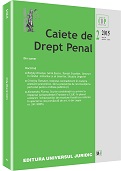Competenţa UE în materie penală. Scurte consideraţii privind modalitatea de incriminare la nivel european
EU criminal law competence. Brief reflections on the offence description at the European level
Author(s): Gabriela OlaSubject(s): Law, Constitution, Jurisprudence
Published by: Universul Juridic
Keywords: Euro-crimes; actus reus; implied powers; harmonisation; division of competence; responsibility for the legislative process; vaguely worded elements; clarity principle; CJEU-ECHR relationship; mens rea of Euro-crimes.
Summary/Abstract: The coming into force of the Treaty of Lisbon is bound to reconfigure the concept of national sovereignty as it puts an end to the exclusive national legislative competence in criminal matters by enabling the European legislator to define criminal offences and establish sanctions, at least in the areas of particular serious crime with a crossborder dimension, and in those cases in which the approximation of criminal laws and regulations of the Member States proves essential to ensure the effective implementation of a Union policy in an area which has been subject to harmonisation measures. However, questions rise as to (1) whether this new express competence necessarily implies that the intervention of the European legislator in defining certain criminal offences cannot be done on account of implied powers, by means of a regulation rather than through a directive, for example, in those cases in which the Union’s objectives demand an intervention by means of such a regulation; and as to (2) whether the intervention of the European legislator in criminal law matters, as it is regulated at the moment, should be regarded as a genuine act of criminalization. As far as the first question is concerned, the author tries to show that a clear answer cannot be given if we were to consider the CJEC’s case-law which dealt with the Communities’competence in defining criminal offences prior to the entry into force of the Lisbon Treaty. As to what the second question is concerned, in light of the characteristics of the EU intervention in criminal law, which for the moment should only take the form of a ‘simple’ harmonisation measure, the author considers and further tries to prove that the answer to the question must be a negative one. The article tries to point out the fact that although the ability to define criminal offences undoubtedly implies that there is a ‘European competence’ in the creation of the objective element (actus reus) of the Euro-crimes there remain, however, constitutive elements of these criminal offences which are not fully addressed at a European level because they are, for example, worded in a rather vague manner by the European legislator. In case of such elements, the responsibility to ensure the respect of human rights (mainly the requisites of the principle of legality) when introducing the new criminal offence rests on the shoulders of the national legislator; it is at the national level where the definition of such elements must be completed in such a manner as to be in accordance with the principle of clarity. In case one of the constitutive elements of the Euro-crime will not meet the requirements of the clarity principle, it shall be the implementing national legislation the one to be declared void, rather than the European directive.
Journal: Caiete de drept penal
- Issue Year: XI/2015
- Issue No: 02
- Page Range: 106-121
- Page Count: 16
- Content File-PDF

